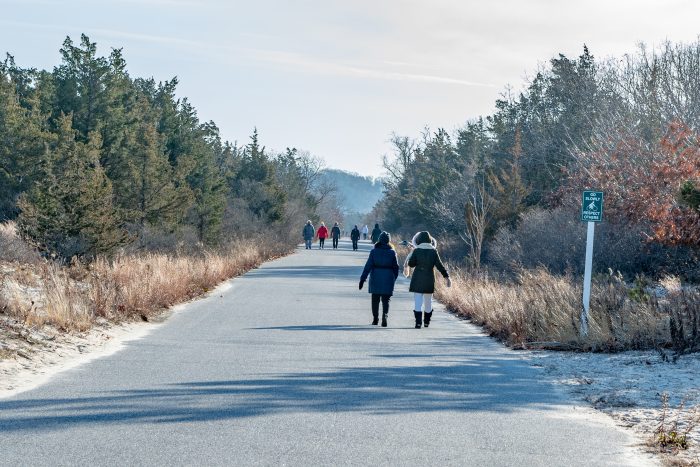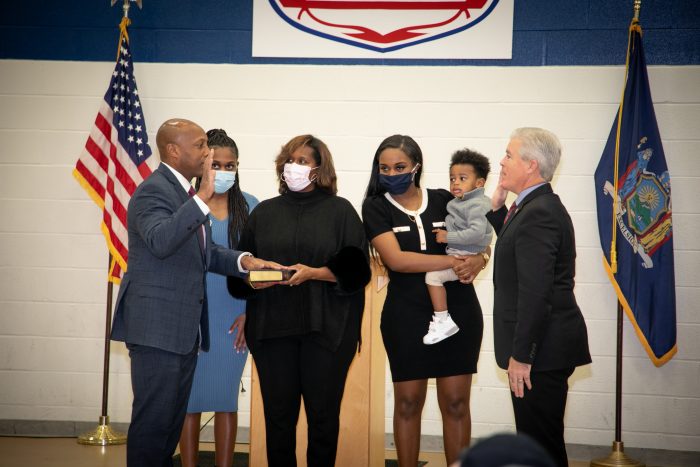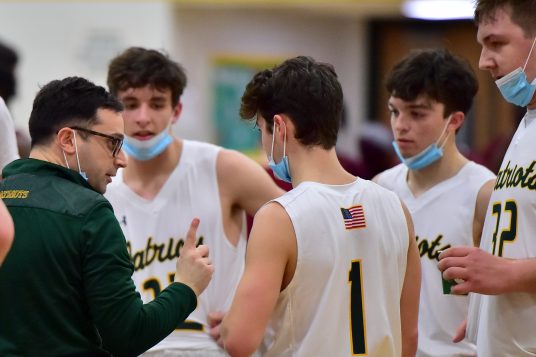Two person show explores color and chance through sculpture and abstract painting
By Tara Mae
Kicking off 2022, Gallery North explores the beauty born of controlled chaos and how that informs the power, impact, and usage of color through the raku sculptures of Gina Mars of Huntington and the abstract oil paintings of Ellen Hallie Schiff of Glen Cove in an exciting exhibit titled Chroma-Tenacity. The show opens Jan. 13.
Although Mars has a long-standing relationship with Gallery North, it is Schiff’s first exhibition at the gallery, and the pairing provides a unique opportunity for the artists to showcase their work in a way rarely seen, according to Executive Director Ned Puchner. The mixed media display, featuring approximately 53 pieces, was a calculated departure from the gallery’s standard procedure.
“I am excited to see 3-dimensional work shown at the same time as 2-dimensional work. Often, we segment those things: the former in the gift shop, the latter in the gallery. I love the interplay between 3-D and 2-D; it’s important to me,” he said.
Despite their different modes of expression, Mars and Schiff’s work shares certain commonalities that are interwoven into overall continuity and themes of Chroma-Tenacity.
“It really has to do with them trying to experiment and stay driven towards the goal of creating something beautiful that contains chaos. The exhaustion that comes with uncertainty runs through how we live right now and also this work,” said Puchner.
This notion of tranquility in turbulence and meaning in mayhem are continuous themes of Mars and Schiff’s art, from concept to creation, reflected in the process and the final product.
“Control and chance are elements in both of their work. Both artists focus on the importance of color, attention to detail, and creating refined pieces. Gina’s sculptures focus on understanding the chemistry that exists within the glazes and surface texture, yet allowing them to have this spontaneous reaction. Ellen’s work involves destroying things to build them back up,” said curator Kate Schwarting.
Mars primarily works in raku, a sculptural style that involves rapidly firing pottery or sculpture. Her decorative and functional pottery is removed from the kiln at 2000 degrees and put in a covered container with combustibles (Mars likes to use pine needles and newspaper). The smoke interacts with the glaze and creates all different colors.
Mars makes her own glazes, either color or crackle, which is a white glaze that, upon being taken out of kiln, shrinks in the air causing cracks. When the sculpture is put into the bin, the smoke gets into the cracks and makes incredible hues.
Her pottery features iridescent glazed bodies and crackle glazed lids.
“I love to go bold with my work and with color, push the limits of creativity, mixing different mediums. I may use different kinds of glaze firings, or different kinds of materials,” said Mars. “I like to take a lot of risks and [create] the vision that I see in my head; I don’t let anything influence me but my own ideas.”
Schiff is also open to the experience of creation informing her art, rather than adhering to a preconceived plan. Her work captures not only what is there but what is left behind as she applies layers of paint and then scrapes them away to form her works.
While experimenting with different markings, Schiff has sought to expand her color palette in the past year.
“I am interested in exploring. I try to really be open to what is happening on the canvas, what may occur, what I may explore with. I am intentional but I am also open to what may happen. I’m starting with the paint, I’m not starting with a narrative. Narrative may develop from putting the paint on the canvas. My work is about color and intention,” she explained.
This shared willingness to play around with colors, tones, and forms is what first drew Schwarting to assembling this joint exhibition.
“Gina started branching out in the past year [with] new motifs, materials, and experimenting with her process. I was really drawn to the sculptural elements and the dark surfaces that become luminous. Ellen’s art also evolved — it got brighter. The attention to texture and color is what really stood out to me: earthy, weathered, worn, but with incandescent color. Gina’s art has a very similar feeling to what Ellen has in her paintings. The breadth, range, and simultaneous cohesion of this exhibition make it a truly unique experience and one we are excited to share.”
Exhibition-related programming will include an ArTalk on Location, featuring both artists, to be published on YouTube on Feb. 3 and a one-day pottery workshop with Gina Mars in the Studio on Feb. 4 from 5:30 to 8:30 p.m.
Gallery North, 90 North Country Road, Setauket is open Tuesday to Saturday, from 11 a.m. to 5 p.m. and Sunday from 1 to 5 p.m. For more information, call 631-751-2676 or visit www.gallerynorth.org.







































